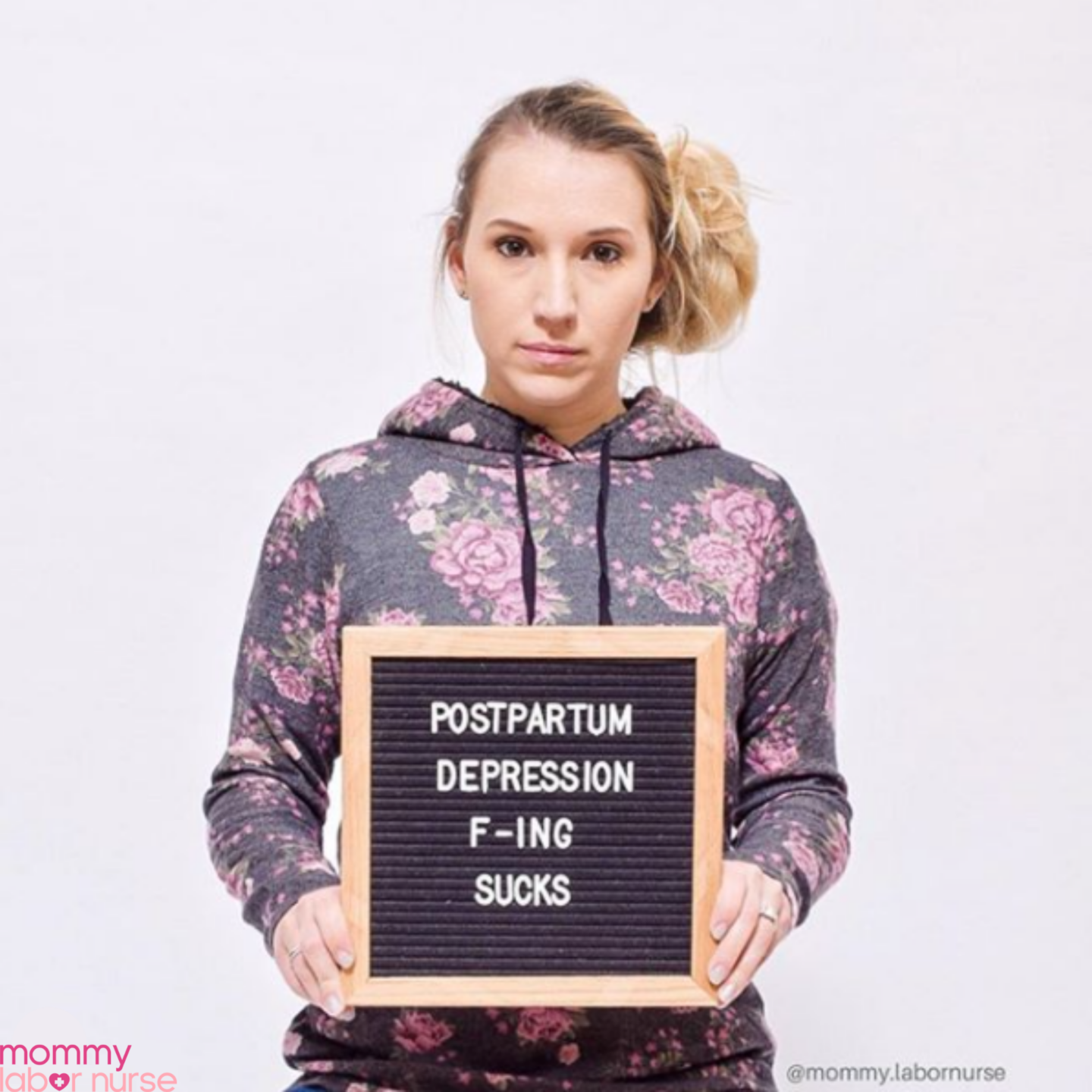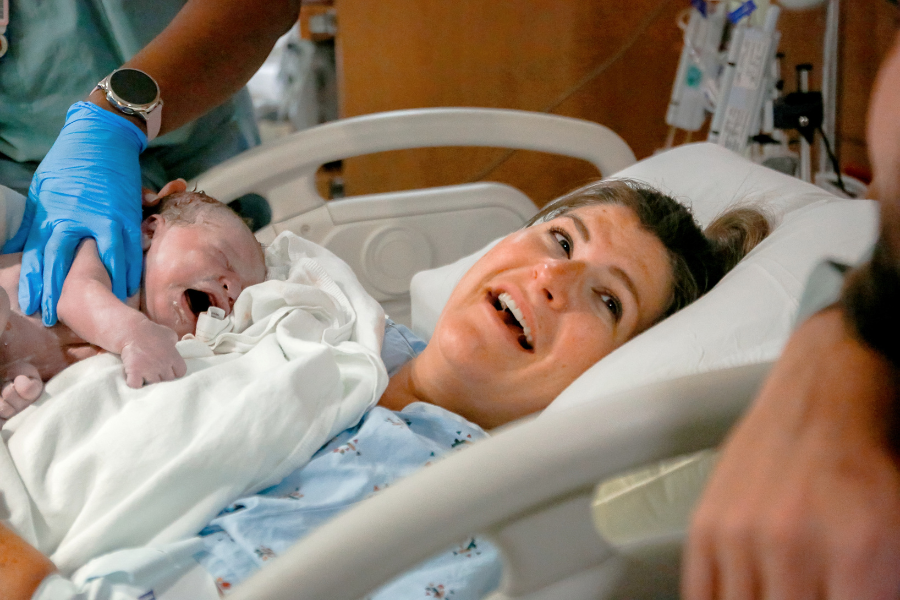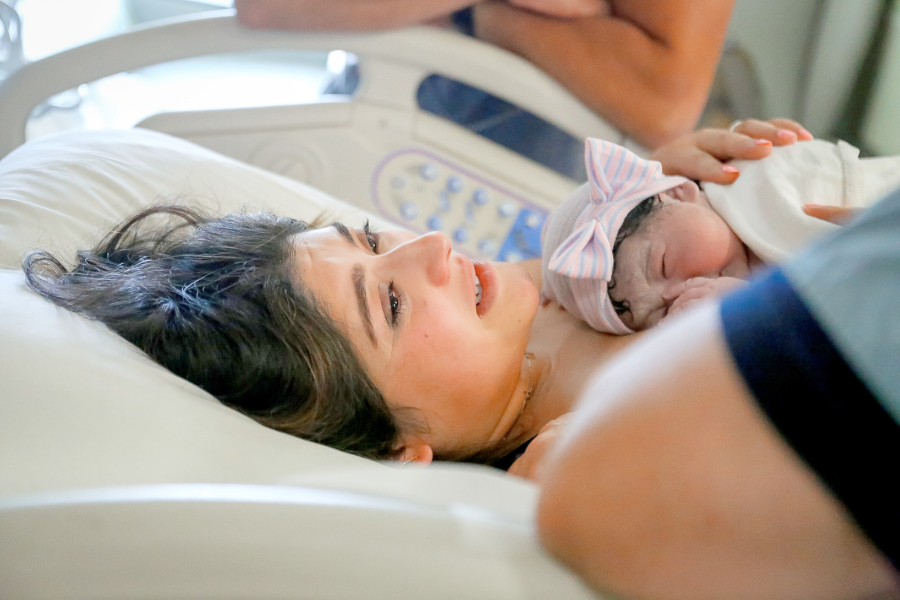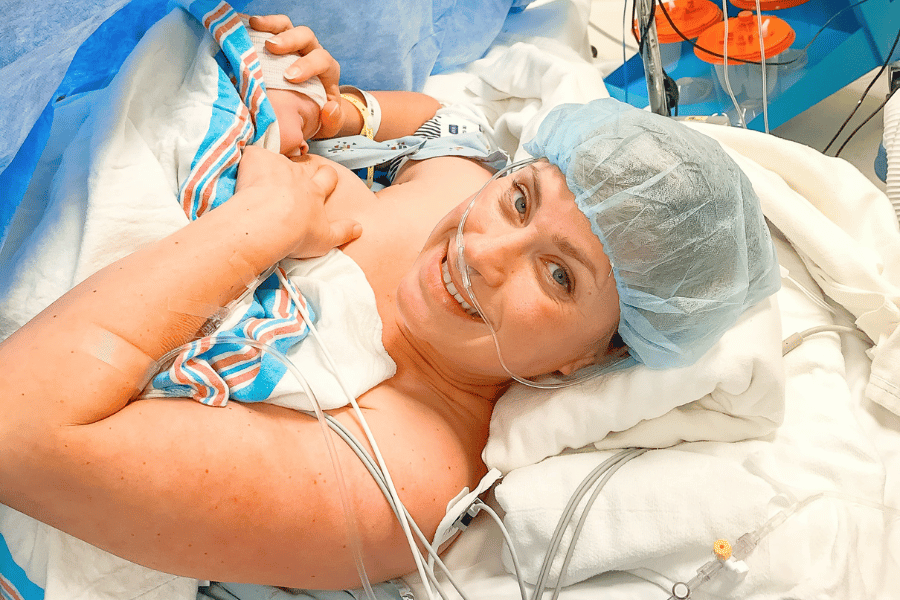Looking for postpartum depression tips is probably the last thing you expected to have to do.
From the moment you saw that little blue smiley face or those tauntingly elusive blue strips that confirmed that you were pregnant, your life changed forever.
That’s one of the things that makes understanding postpartum depression SO hard – how do you determine whether what you’re feeling is just the normal “growing pains” that come with new motherhood, or something deeper and more destructive?
Here’s the thing mama. Postpartum depression SUCKS. A lot.
There is no emoticon to do this insidious force justice, and no partner will ever truly understand.
Dealing with your own physical postpartum recovery is difficult enough on its own. Stack upon that those sleepless nights and those exhausting cluster feedings – it’s not really fair when postpartum depression squishes its inky tendrils through the cracks.
Don’t feel too discouraged though, mama. You’re tough and you WILL get through this. While I didn’t personally experience postpartum depression with my baby, I have heard from many struggling mamas just like you.
Follow @mommy.labornurse on Instagram to join our community of over 650k for education, tips, and solidarity on all things pregnancy, birth, and postpartum!
What is postpartum depression?
Postpartum depression is a severe form of depression that starts following the birth of a baby. While postpartum depression may start at any point within the first year of baby’s life, most women are affected within the first few months.
Signs of postpartum depression
There’re a couple of things I want you to consider before you read over the common symptoms of postpartum depression, okay?
- First, unfortunately, there’s no cut-and-dry diagnosis when it comes to postpartum depression. There is a myriad of ways it presents in new mamas, which makes it hard to know whether or not you’re dealing with postpartum depression. This, paired with the shame we invariably feel due to the stigma of mental health issues, makes it easy to want to minimize what we’re dealing with.
- Second, you don’t have to be showing #allthesigns to be struggling with postpartum depression. Again – it looks different for everyone.
- Third, is the sheer fact that we all have good days and bad. Withdrawing from the world and/or feeling overwhelmed for a day or two doesn’t necessarily guarantee that you have clinical postpartum depression.
Those with clinical postpartum depression have been suffering from symptoms for around two weeks.
Common symptoms of postpartum depression
- Feeling sad, numb, or hopeless
- Inability to focus or concentrate
- Crying often, sometimes without knowing why
- Fatigue and difficulty sleeping and/or eating in general
- Feeling guilty, overwhelmed, or worthless
- Feeling disconnected from and potentially/subsequently withdrawing from your support system
- Losing interest in hobbies or preoccupations that you previously cared about
- Feeling irritated or angry often
- A sensed or perceived lack of bonding with your baby
- Suicidal thoughts
- Thoughts of hurting your baby
How common is postpartum depression?

Postpartum depression occurs in 1 of 9 women. That number is crazy high! Unless you only know 8 women, this it means we ALL have ladies in our lives who’ve dealt with or are currently battling postpartum depression.
Sadly, it’s extremely likely this number is even higher since plenty of women never seek help or KNOW that they’re suffering from it. You can easily imagine those people in your life that would silently suffer out of shame, hopelessness or a sense of obligation.
It absolutely breaks my heart.
Related Reading: 5 Life Changing Ways to Overcome Postpartum Anxiety
Postpartum depression causes
This is another one of those tricky things where there isn’t anything specific that causes postpartum depression. There are some different things that may be contributing factors, but again – you may have all, some, or none of these issues.
I think the MOST important distinction to make is that IT IS NOT YOUR FAULT if you’re suffering from postpartum depression. I’ve seen too many new mothers feel a whole lotta guilt and shame because they think THEY did something wrong or that something is wrong with them.
Postpartum depression risk factors
1. Pregnancy hormones
You already know how out of whack your hormones are during pregnancy. Welp, it’s also a thing postpartum.
You’re experiencing a huuuge drop in some of those hormones (such as estrogen and progesterone), which can contribute to postnatal blues—a woeful understatement if ever there was one.
2. Thyroid hormones
Hormones produced by your thyroid gland can also drop quickly during the postpartum period. A drop in thyroid hormones can make you feel tired, sluggish, and grey.
3. Postpartum healing
I wish someone had explained to me just how difficult postpartum healing was in its own right. Your body takes a gargantuan hit with the birth of your baby, so it’s a small hop to expect that these changes could/would contribute to your depression.
There’s nothin’ hot about urinary incontinence or healing a vaginal tear – and you have to take care of a BABY on top of all of the healing your body is required to do.
4. Difficulty with breastfeeding
While there isn’t a ton of research on this yet, there have been a few studies (like this one) that have shown a link between breastfeeding mamas and postpartum depression. The highest prevalence of new moms with postpartum depression were the ones that:
A. PLANNED on breastfeeding but ended up not doing so, and
B. Suffered from depression DURING pregnancy.
If you find that you’re struggling with breastfeeding, it may be worth checking out Stacey’s Milkology course. She holds your hand through the breastfeeding process and can help teach you how to deal with the toughest problems.
5. Postpartum PTSD
Postpartum PTSD (post-traumatic stress disorder) is a real thing that too many new mothers end up encountering due to a bad labor and delivery experience. Understandably, postpartum PTSD can have long term and far-reaching consequences.
Postpartum PTSD is something that we’re finally beginning to understand, and reports state that it affects 4% of women giving birth (although actual numbers may be higher).
6. Here are a few other risk factors for PPD
- Lack of family support
- Changes to physical appearance
- A history of depression
- Relationship issues
- Financial issues
- You had postpartum depression with another birth
- NICU or other special needs problems
Related Reading: Strange Postpartum Symptoms
What are postpartum blues?
Postpartum blues (aka baby blues) is like a minor form of postpartum depression. It’s a feeling of sadness that many new mothers experience after their baby’s birth. A whopping 80% of new moms experience baby blues.
Baby blues symptoms
- Feeling sad, moody, or irritable
- Having trouble eating and sleeping
- Indecision
- Feeling like an inadequate mother
What causes baby blues?
The crazy change to both your hormones and your life combine for a potent recipe of baby blues. Baby blues usually happens pretty soon after birth, but it only lasts a week or so. Once your hormones level out a little it’ll typically improve.
Postpartum Depression Tips
If you still aren’t sure whether you’re dealing with postpartum depression or not, I recommend checking out this quiz. You can share your results with your provider, which can be an easy way to start the right conversation.
1. Seek help
Although I KNOW this is something all moms who’re looking for postpartum tips hear, sadly, too few of them follow through. Seeing a therapist can significantly help you improve your mental state. Having someone that MUST listen to your problems and is trained to MAKE YOU FEEL BETTER. Crazy talk, I know.
For me, I think it’s incredibly useful to have an unbiased third party who will listen, empathize, and guide you in solving your postpartum depression. Your experience will be unique to you – so individualized care is probably the fastest route to recovery.
If you aren’t sure how to get started and are in the U.S., you can call the Substance Abuse & Mental Health free national hotline number. Here’s their website.
It’s confidential and available every hour of every day of every year. Even on Christmas morning when your husband and older kids are happily chatting and playing and you simply cannot bear to look at your baby for one more instant.
They can help you find mental health providers, support groups, and community-based organizations that can help.
2. Self care
The mantra that you can’t take care of anyone else if you aren’t taking care of yourself is TRUE, mama. There’s certainly merit in faking it on the off chance you’ll make it. However, taking time for self-care is one of the HARDEST things you’ll do postpartum; It’s also one of the most important.
It can be as complex as a trip to Hawaii or as simple as taking a bath. Ask a friend or family member to come and sit with baby a couple of times a week. Light some candles, grab some lavender essential oils, and relax. It’s amazing what some peace and quiet can do for you.
3. Exercise
Exercise is SO good for you postpartum. Not only is it one of the best things you can do to get your body back in shape, but it can do AMAZING things for your mental health.
Pack up baby in the stroller and go for a walk. This isn’t just for the exercise, so don’t think a treadmill will give you the same value.
When exposed to sunlight, your serotonin levels increase while your melatonin levels decrease. That means there’s a scientific reason that you NEED to be out getting some fresh air.
If that’s not enough, exercise has been shown to decrease stress, so it’s definitely worth it all around.
4. Good nutrition
Although the connection between postpartum depression and nutrition is not entirely understood, we do know that nutrition plays a significant role in brain function.
As new mamas, we are already operating at less than optimal brain function when dealing with a new baby. Eating healthy can help you make it through the day.
Also remember: after childbirth (and especially if you’re breastfeeding) your body needs more nutrients to heal, so give your body what it needs!
Hint – Omega 3’s are SUPER good for this, so eat some seafood–since you FINALLLY CAN again!
Additionally, it may be worth getting your Vitamin D or your Vitamin B levels checked. Many times, if either of these levels are off, they can present similarly to postpartum depression (or any type of depression)
5. Seek familial support
Asking for help and being vulnerable is hard for many of us because we see needing help as some kind of failure or weakness. Challenging that frame of mind is the only way to truly overcome it.
Remember that we ALL need support sometimes. You’re doing yourself, your baby, and your loved ones a huge favor by continuing to engage with them. Vent to someone who you know will love you unconditionally and validate what you’re going through.
And avoid judgments. That’s huge at this stage. If your mother or mother-in-law is overcritical or your father-in-law tends to think depression is all just a choice, these are probably not the best recipients of your heart in a teacup.
6. Find an in-person mom group
Most communities have social groups you can join (like a La Leche League for breastfeeding). Find a group of other moms of babies and introduce yourself.
It takes some guts to do this, but it can be incredibly rewarding when you’re with a group of people who’re going through the same thing as you. Not only are you going to feel supported and validated, but you also may pick up a few tips that’ll help make life with a baby easier.
Everyone’s at a different stage with their new babies, and everyone has unique perspective or best practices. Take full advantage of the village if you’ve access to it.
7. Join a mom Facebook group
These groups can come in handy if you can’t bring yourself to join a physical group, or you just don’t have the time. While these groups can be incredibly helpful – be cautious.
Keyboard warriors are a lot more comfortable hiding behind a screen, so sometimes these communities can end up being detrimental instead of helpful. Find a community mom group where your opinions and ideals are shared.
The best way to avoid getting mired in deprecating or judgmental conversations is to NEVER rise to the bait. Let people think they are smarter if they want to think so, and offer gentle correction where necessary. Don’t jump for the flame war and you should be relatively safe.
If not, LEAVE. You don’t owe the internet people anything. This is a resource for you, and it’s only as valuable as it is positive.
8. Practice bonding with baby
I see a lot of guilt from moms who feel like they aren’t bonding with baby right after birth. It’s actually somewhat common – especially if you’re suffering from postpartum depression.
Often these moms try to overcompensate because of their guilt, but this usually backfires because they deplete their mental and physical energy below the levels they can reasonably handle. Once you’re too exhausted, it becomes a task to even TRY to build a relationship with your baby.
You shouldn’t feel BAD about struggling to bond with your baby – it just may come a little later for you.
Don’t get me wrong, bonding with your baby is incredibly important, because now is the time that they’re learning to form healthy attachments that will impact their entire life, and you’re first up in showing them how. No pressure, though.
If you’re reaching that point, take full advantage of low key and low energy routines like rocking or singing to them, or giving simple skin to skin contact. A cuddle is one of the most recuperative activities a human can perform, with or without babies to complicate the mix.
Don’t overdo it, and certainly don’t let this become another stress factor in your life. Remember that you’ll get there. It’s impossible not to let that shared compassion and interdependence grow if you have your heart in the right place.
9. Write it out
For some people, writing out what you’re feeling can be incredibly cathartic. Pen and paper is a great way to get out all of your feelings if you don’t want to share them with someone.
It can be symbolic for some people, so consider crumpling or ripping it up when you’re done, to symbolize these overwhelming feelings leaving your body.
Regardless of HOW you do it – you should not be keeping all of the negative feelings inside of you. Exorcise those demons! Can I get an “amen”!?
10. Hire a doula
I’m TOTALLY serious about this one! Not only can a postpartum doula help guide you through different newborn care duties, but they can also help keep an eye on your newborn so you can get a nap (or bath, shower, whatever).
Having someone who can validate your worries and fears, help around the house (without judgment), and ease you into motherhood is a priceless gift. Most doulas consider this part of the job, just be sure to read up on their service offering or reach out with questions beforehand.
11. Get some sleep!
Crazy talk, I know. I recognize that it’s a little unfair to expect this of you, or to make this recommendation as if it wasn’t already a top priority and one of your heaviest sacrifices. Everyone tells the new moms in their life to practice good sleep habits, but almost none of us actually do it.
Sleeping enough can definitely improve your mood and cancel out some of that zombie-esque state you’re in postpartum.
I’m now going to tell you that age-old advice that so infuriates me when I hear it again and again. Sigh.
Take naps and sleep when baby sleeps.
There. I said it. #sorrynotsorry. I hope you’re happy, mother-in-law.
To be very clear, I’m not saying this is EASY to do, but it’s NOT impossible. Many of us spend that time catching up on housework. There are pressures around the house that seem to lean in over us, threatening to topple down if we don’t stay two feet above the rising surf.
Let it go once in a while mama, and let yourself be okay with that. If it’s really out of control, call for backup and let yourself feel good about giving others the chance to serve you. You have been through a lot, and you DESERVE a little help and some much needed rest.
Your postpartum depression will not define you
Last (and certainly not the least), I want to say I’m sorry you’re going through this mama. Postpartum depression sucks. I know things are hard right now, and it’s difficult to imagine it getting better.
But, I can tell you with total confidence that this will pass.
Take it one day at a time, and hang in there, mama. I’m cheering for you every step of the way.





